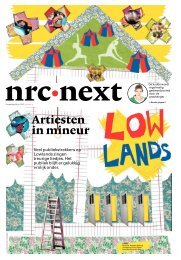een antropologisch onderzoek naar de kortstondige inzet van ... - Nrc
een antropologisch onderzoek naar de kortstondige inzet van ... - Nrc
een antropologisch onderzoek naar de kortstondige inzet van ... - Nrc
You also want an ePaper? Increase the reach of your titles
YUMPU automatically turns print PDFs into web optimized ePapers that Google loves.
Summary<br />
This thesis is the outcome of an anthropological research on short term medical work of Dutch health<br />
workers in <strong>de</strong>veloping countries, especially in Africa. During the last few months a lot of media attention<br />
has gone towards the negative si<strong>de</strong>s of this kind of work. I <strong>de</strong>ci<strong>de</strong>d to research the topic by trying<br />
to answer the following question: How do different people involved experience the short term work of<br />
Dutch health workers in <strong>de</strong>veloping countries, especially in Africa? Research was carried out both in<br />
Holland and Ghana. Data was collected through interviews, observations and (in)formal conversations.<br />
The people involved were divi<strong>de</strong>d into three groups.<br />
The first group consists of Dutch long term health workers who have worked in a <strong>de</strong>veloping<br />
country for over a (ongoing) year. There is much diversity in the way Dutch long term health workers<br />
speak about the work of short term health workers. Some of them are very sceptical for various reasons<br />
such as their personal motives, their goal, attitu<strong>de</strong> and way of working. Their most important concerns<br />
are: inexperience with working in <strong>de</strong>veloping countries; lack of knowledge about the local situation,<br />
language and habits; therefore inability to foresee possible risks; and not enough cooperation with the<br />
local health workers. An argument in favor of the short term work in <strong>de</strong>veloping countries, reasoned<br />
from the perspective of the <strong>de</strong>veloping countries, is that any help is nee<strong>de</strong>d as long as <strong>de</strong>veloping<br />
countries have a shortage of health workers to provi<strong>de</strong> health care to all inhabitants. Other arguments<br />
in favor of short term work, s<strong>een</strong> from the perspective of the Dutch health workers, are the opportunity<br />
to learn and possibly an increased interest in tropical medicine.<br />
The second group consists of Dutch short term health workers who have worked in a <strong>de</strong>veloping<br />
country for less than a (ongoing) year – often a few weeks, sometimes a few months. Contrary to what<br />
many Dutch long term health workers believe, most Dutch short term health workers have previously<br />
worked in a <strong>de</strong>veloping country. Some of them are well informed about the local situation, while<br />
others have no i<strong>de</strong>a. They are all badly informed by the organizations that send them out. Most of<br />
them consi<strong>de</strong>r the impact of their work as nothing more than a drop in the ocean. The most important<br />
reasons for them to go are adventure, curiosity, and solidarity. The reason for their short term stay is<br />
solely practical: they cannot or do not want to leave their work or family for a longer period of time.<br />
The third and last group consists of local health workers in Ghana working at hospitals visited by<br />
Dutch health workers. The extent to which local health workers in Ghana appreciate the short term<br />
work of foreign health workers is first of all <strong>de</strong>termined by the extent to which they are informed about<br />
the arrival of foreign health workers: the date of arrival, their number, qualifications and intentions.<br />
Secondly, their appreciation is <strong>de</strong>pen<strong>de</strong>nt on whether the foreign health workers communicate with<br />
the local health workers during their stay. Sometimes there is hardly any communication betw<strong>een</strong> the<br />
two groups. Not asking for or listening to the needs of the local hospitals leads to foreign health workers<br />
working at hospitals while there is no real need for them, local health workers without motivation<br />
to cooperate and hospital spending more money (on accommodation, transport and food for these<br />
foreign health workers) than they can afford.<br />
An anthropological analysis of the research data shows that the interpretations of the experiences<br />
of the three groups of people involved are highly influenced by their situation and culture. Dutch<br />
short term medical aid in <strong>de</strong>veloping countries can reach a major improvement by meeting both the<br />
objections and suggestions of Dutch long term health workers and local health workers in <strong>de</strong>veloping,<br />
ánd the needs of Dutch short term health workers. Probably the best method to do so, is to let local<br />
health workers in <strong>de</strong>veloping countries <strong>de</strong>ci<strong>de</strong> what kind of short term aid is nee<strong>de</strong>d most. In this way,<br />
problems caused by differences in situation and culture are less likely to evolve, because the Dutch<br />
health workers are working within the framework of the local structure and culture.<br />
xi


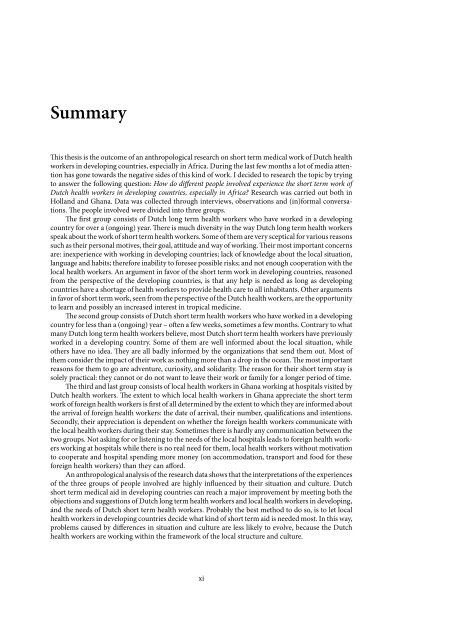
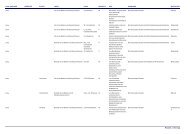

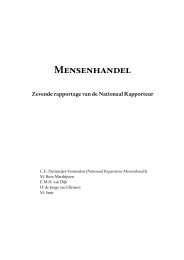
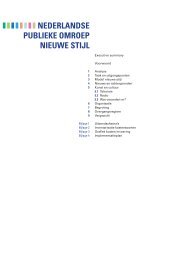
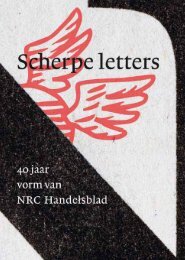

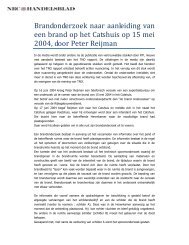

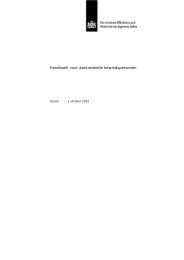
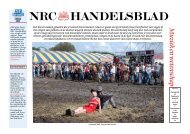
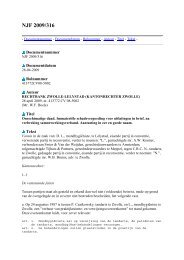
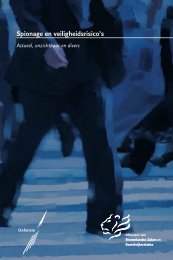
![Belediging van een agent: een geval apart![1] - Nrc](https://img.yumpu.com/19727127/1/184x260/belediging-van-een-agent-een-geval-apart1-nrc.jpg?quality=85)
